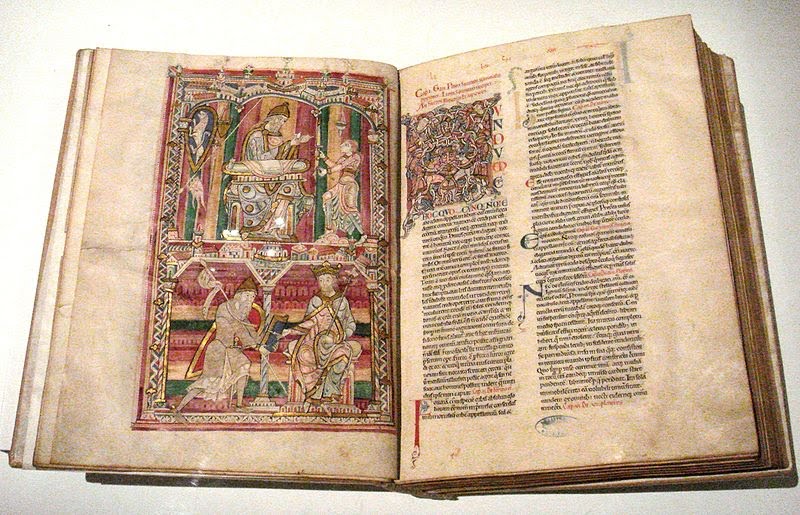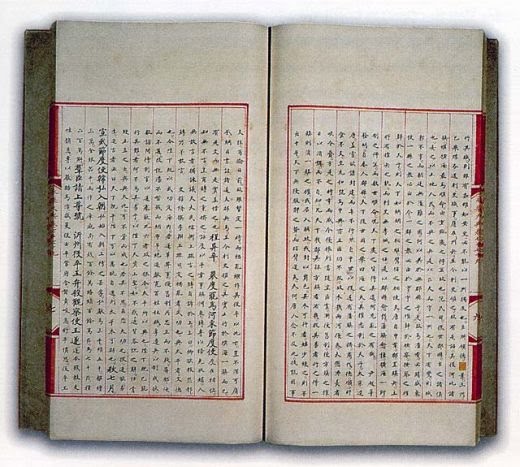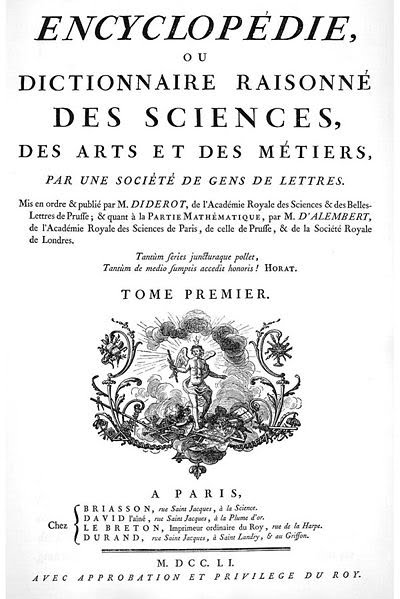Publishing History > A Short History of the Greatest Encyclopedias of Past and Present
A Short History of the Greatest Encyclopedias of Past and Present
An encyclopedia (or encyclopaedia) is a comprehensive reference work, either general (aiming to cover all fields) or specialized (aiming to cover one field).
Until recently, encyclopedias have been printed works, either single or multi-volume, with or without illustrations. The entries are arranged either alphabetically or thematically. They often included aids for the reader such as cross references and indexes.
With the arrival of the Internet many encyclopedias are now also published online. Some current encyclopedias are exclusively online with no print edition being published.
Encyclopedias in the Ancient World
The works of Aristotle were an attempt to encompass all the knowledge of the ancient Greek era.
In ancient Rome Marcus Terentius Varro compiled a nine-volume encyclopedia of the liberal arts, Disciplinae (The Disciplines, 30 BC). No copy of this work survives.
The oldest complete encyclopedia that has survived from the ancient world is the Naturalis Historia (Latin for "The Natural History") which was publised in ca. 77-79 AD) by the Greek author, naturalist and natural philosopher, Pliny the Elder. This encyclopedia specialized in the natural sciences and comprised 37 volumes and 2493 chapters.

Figure 1: The Naturalis Historia by Pliny the Elder. It was originally published in ca. 77-79 AD. This is a mid-12th century manuscript of the work, located in the Abbaye of Saint-Vincent, Le Mans, France.
Medieval Encyclopedias
The greatest encyclopedia of the medieval period was the Speculum Majus (The Great Mirror, 13th century). It was compiled by the Dominican friar, Vincent of Beauvais. In 1481 it was translated into English and printed by William Caxton as The Myrrour of the Worlde.
The greatest Chinese encyclopedia, the Yongle Encyclopedia, was completed in 1408. This encyclopedia covered a large range of subjects, was written by more than 2,000 scholars, and comprised 11,095 volumes. It was to be the world's largest encyclopedia for the next 600 years.

Figure 2: The Yongle Encyclopedia (1403-08)
Renaissance Encyclopedias
The English philosopher Francis Bacon worked on, but unfortunately never completed, his Instauratio Magna (The Great Reconstruction, that is, of human knowledge). This work was planned as a great encyclopedia of all knowledge to be created using a clear work method and laid out according a philosophical scheme.
Modern Encyclopedias
Ephraim Chambers published his Cyclopaedia in 1728.
The French philosopher and writer Denis Diderot and his associates published the massive Encyclopédie, ou dictionnaire raisonné des sciences, des arts et des métiers (Encyclopedia, or a systematic dictionary of the sciences, arts, and crafts) in 1751-76.

Figure 3: Title Page of Diderot's Encyclopédie (1751-76)
The first edition of the Encyclopaedia Britannica was published in 1768-71.
Recent multi-volume English-language encyclopedias have included the Americana, Britannica, Chambers, Collier's, Everyman's, Groliers, and World Book.
French multi-volume encyclopedias include La Grande Larousse and the Encyclopaedia Universalis, and German examples include the Brockhaus and the Meyers.
Sadly, a number of the print versions of these multi-volume encyclopedias will not be published in new editions in the future but some will be published on the Internet.
In this section we have so far discussed general encyclopedias. There are also more specialized encyclopedias which treat just one theme. Some of these include the Encyclopedia of World Art (1959–68), The New Grove Dictionary of Music and Musicians (1980; 2nd ed., 2001), and the McGraw-Hill Encyclopedia of Science and Technology (1960; 9th ed., 2002).
Internet Encyclopedias
The rise of the Internet has seen the publication online of a many general and specialist
encyclopedias.
Foremost among the general encyclopedias online for the English-speaking world are Wikipedia and the Encyclopedia Britannica. Wikipedia's articles are built using the contributions of many writers, often anonymous; the Britannica's articles are written by identified experts and are peer reviewed before publication.
Specialized online encyclopedias are many and of varying quality. Some of these are online copies or adaptations of works originally in printed form. A splendid example is Oxford Music Online, which takes its content from a number of sources including The New Grove Dictionary of Music and Musicians, the Encyclopedia of Popular Music, the Oxford Companion to Music and the Oxford Dictionary of Music.
The Stanford Encyclopedia of Philosophy is another specialized encyclopedia of excellent quality, each of its articles being written by and reviewed by professional philosophers. It is only published online and has no print counterpart.
A number of historic encyclopedias are being republished on the Internet (see below).
Which was the Largest Encyclopedia Ever?
With 3.1 million articles, and 19.3 million pages (as at February 3, 2010), the online encyclopedia, Wikipedia, claims to be the largest encyclopedia ever written.
But there have been other massive encyclopedias which still merit our attention:
-- Allgemeine Enzyklopädie der Wissenschaften and Künste ("Universal Encyclopedia of Sciences and Arts"). This monumental German work published over many decades from 1813 under the editorship of Gruber and Ersch. By 1889 the encyclopedia had reached 167 volumes. Some of the articles are equally massive: for example, the article "Greece" comprised 3,668 pages. Robert Collison describes this encyclopedia as "the greatest Western encyclopaedia ever attempted"[1].
-- The Yongle Encyclopedia from China was one of the largest encyclopedias of history (see above). The work, which was completed in 1408, comprised over 11,000 handwritten volumes and over 370 million Chinese characters.

Figure 4: Meyers Konversations-Lexikon, 4th edition (a little the worse for wear)
Historic Encyclopedias on the Internet
Historic encyclopedias are always worth consulting, both for their articles by great scholars of the past, but also for their treatment of many persons and events which are not covered by more recent works.
For our reading convenience, a few of them are now being republished on the Internet:
Encyclopaedia Americana, 1851 edition.
Encyclopaedia Britannica, 9th and 10th Editions (1875-1903). 35 volumes. Known as the "Scholar's Edition" due to the high caliber of its article contributors, such as Frazer, Huxley, Kelvin, Kropotkin, Maxwell, Morris and Swinburne.
Encyclopaedia Britannica, 11th Edition (1910-11). 30 volumes.
Encyclopédie, ou dictionnaire raisonné des sciences, des arts et des métiers (Encyclopedia, or a Systematic Dictionary of the Sciences, Arts, and Crafts) (1751-76). 28 volumes. The great encyclopedia of the French Enlightenment. Contributors included Voltaire, Rousseau, Diderot and Montesquieu.
Grosses vollständiges Universal-Lexicon aller Wissenschafften und Künste ("Great Complete Encyclopedia of All Sciences and Arts") (1731-54). 68 volumes.
Meyers Konversations-Lexikon, 4th Edition (1885-92). A great German encyclopedia of the 19th century.
Further Reading
Books
Collison, Robert. Encyclopaedias: Their History Throughout The Ages; A Bibliographical Guide with Extensive Historical Notes to the General Encyclopedias Issued Throughout the World From 350 B.C. to the Present Day. 2nd edition. New York: Hafner Pub. Co, 1966.
Walsh, S. Padraig. Anglo-American General Encyclopedias: A Historical Bibliography, 1703-1967. New York, R. R. Bowker, 1968.
Articles
Article "Encyclopaedia" in: Encyclopaedia Britannica, 9th Edition
Wikipedia, Britannica: A Toss-Up - Results of Nature's Comparative Study
Nature's response to criticism far from pristine - Rejection of Nature's study
The Six Sins of Wikipedia (previous title: Wikipedia, Criticism of)
Specialized Encyclopedias: Music
Specialized Encyclopedias: Australia
References
1. Collison, Robert. Encyclopaedias: Their History Throughout The Ages; A Bibliographical Guide with Extensive Historical Notes to the General Encyclopedias Issued Throughout the World From 350 B.C. to the Present Day. 2nd edition. New York: Hafner Pub. Co, 1966. P. 182.
Share this page:
Author: David Paul Wagner
(David Paul Wagner on Google+)
|



